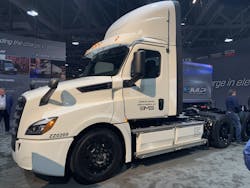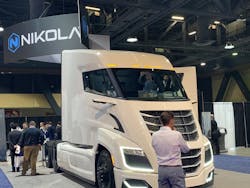The April edition of Fleet Owner included a lengthy feature story on the rapid emergence of zero and near-zero emission trucks.
We selected April because we knew there were several industry events planned that could further raise the prospects for the electrification of commercial vehicles. These events did not leave us disappointed.
No company has received more attention of late than Nikola Motor Co. There were more than 5,000 attendees at the two-day “Nikola World” showcase in Arizona, highlighted by the unveiling of the Nikola Two.
The Class 8 tractor is projected to be ready for U.S. highways in 2022. While it is offered in battery-electric and hydrogen fuel cell models, Nikola CEO Trevor Milton said the majority of the billions of dollars in order reservations are for the latter.
Storage capacity and weight savings relative to pure-electric vehicles are reasons why Nikola is focusing more of its efforts on hydrogen, including a fueling network expected to reach 700 stations by 2028 in the United States.
Hydrogen is “not the most efficient source of energy in the universe, but it never goes away and you can use it forever," Milton said.
Port of Los Angeles officials spoke glowingly of the potential of hydrogen during an Earth Day event where Kenworth Truck Co. and Toyota Motor North America presented its first jointly developed hydrogen fuel cell electric heavy-duty truck to UPS Inc.
However, that same week Roger Nielsen, president and CEO of Daimler Trucks North America, declared that battery-electric technology is the only viable way to achieve emissions-free driving.
During his keynote address at the Advanced Clean Transportation (ACT) Expo, he said fuel cells as range extenders “have promise,” but hydrogen fuel cells alone are not viable.
To see the conversation surrounding electric commercial vehicles advance so far, so fast is quite remarkable.
It was only September 2016 when electrification truly had its initial coming out party. At that year’s IAA Commercial Vehicles show in Germany, manufacturers filled the massive Hanover Fairground with dozens of electric vehicles and related components.
It was immediately obvious tremendous progress had been made since the 2014 IAA show, even if many electric vehicles on display were only concept vehicles for non-U.S. markets.
One notable exception was the Fuso eCanter, which Daimler Trucks began selling in the United States in 2017.
Wolfgang Bernhard, then head of Daimler's commercial vehicles division, said just a decade earlier he didn’t see a market for electric trucks. He credited changes in battery technology, driven by the cellphone industry, for changing the landscape. Investments to further advance battery technology are ongoing today.
The same week as Nikola’s event, Daimler announced it had acquired a stake in U.S. battery material specialist Sila Nanotechnologies. Along with the company’s investment in ProTerra, Nielsen said these partnerships will lead to the breakthroughs that will make electricification economical feasible for fleets beyond the urban delivery space.
At ACT Expo, Daimler displayed the all-electric Freightliner Cascadia and eM2 models. Also on display were the Nikola Two and various electric vehicles from Lion, XOS (formerely Thor) and BYD, among others.
Volvo Trucks North America, slated to begin sales of its all-electric VNR next year, did not bring a vehicle but instead highlighted the ongoing Volvo LIGHTS partnership with several California agencies to develop an "end-to-end" electrification system.
One company once again absent from this year’s event was Tesla Motors. With so many electric vehicles and components all over ACT, it is easy to forget about them.
It was all the way back in November 2017 when Tesla’s unveiling of the Class 8 Semi gave the entire industry a charge. The event was quite a spectacle, drawing global media attention and wide praise for the Semi’s modern design.
Though CEO Elon Musk initially said the first Semis would be available late this year, that has now been pushed back to 2020.
All of these developments add up to a lot of excitement, when imaging just how many of these trucks could make up the U.S. fleet population by the end of the next decade.
Of course, there is still is a long way way to go. As Paul Rosa, senior vice president of fleet planning for Penske Truck Leasing, said at ACT: “This technology has to evolve. There is so much that has to come online for this to work.”
In time, winning manufacturers and technologies are likely to emerge. Regardless of how this plays out, it is clear the trucking industry will emerge a winner in a future of zero emission vehicles.
About the Author
Neil Abt
Neil Abt is a former FleetOwner editor who wrote for the publication from 2017 to 2020. He was editorial director from 2018 to 2020.

